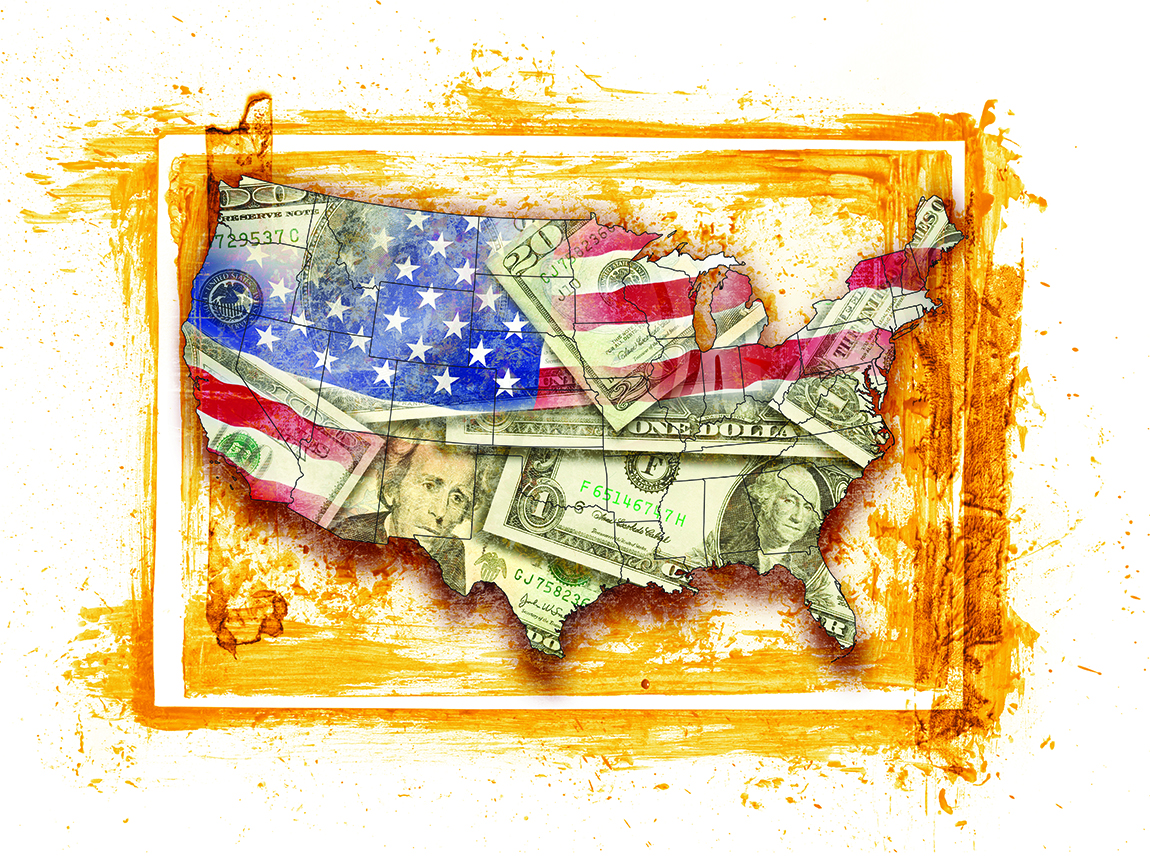Can Democracy and Capitalism Be Reconciled?
Contemporary developments may pose an unprecedented challenge to both, and hyperpolarization is fueling the fire.By: Sidney Milkis ’72 Monday, March 20, 2023 09:21 AM
 Illustration by iStock.com/Grafissimo
Illustration by iStock.com/GrafissimoPerspective is a feature of Muhlenberg Magazine. This article originally ran in the Spring 2023 issue.
This is the right moment to study what is and isn’t going well in democratic capitalism, why and what should be done. There have been other important moments in American political history when we’ve gone through disruptive, transformative changes in the political economy. The last one was during the Great Depression, when Franklin Roosevelt, with support of a fledgling union movement, ushered in the New Deal, with its pioneering regulatory controls on business and social welfare programs. There is another major transformation underway now, which started in the 1990s and peaked in the last decade or so, caused by the disruption in the political economy due to globalization. Globalization and the rise of a service economy has resulted in a 23 percent decline in manufacturing jobs in the past three decades, contributing to the most serious inequality we’ve had since the late 1920s.
Indeed, contemporary developments may pose an unprecedented challenge to democracy and capitalism, both of which are under siege. For example, the commitment to democratic socialism, demanding a substantial role for the state in redressing inequality, seems to be seriously eroding the deeply rooted stigma against socialism in the United States (a September Pew poll showed that 57 percent of Democrats and Democratic-leaning voters had a positive view of socialism). On the right, we’ve seen a turn towards sectarian nationalism, where conservatives no longer believe in limited government. They’re going after “woke corporations” in a way that seems to be a major departure from the kind of conservatism that blossomed in the 1980s.
Although all major transformations in American politics have been deeply contentious, the current confluence of battles over American identity, rooted in the culture wars of the 1960s, and economic disruption marks the most combustible period of American history since the Civil War. Contemporary party wars, which scholars and pundits dub the “Cold Civil War,” have gone so far that each side views the other as an existential threat to their way of life.
Globalization is the clearest economic determinant of our polarization. The major problem is the loss of jobs, particularly jobs that the working class had long depended on that allowed people without a college education to rise into the middle class. Some of those jobs were lost overseas while others were lost to automation. The decline has been place-based, largely in small towns and rural areas. It’s devastated whole communities, and people in those areas often feel like all the attention has been paid to minorities and undocumented immigrants while their economic opportunities and the values of their hometowns have been ignored or treated with contempt.
These perceptions are not entirely accurate; because rural areas and small towns have a disproportionate number of seniors and poor, they get more social welfare benefits and pay less in taxes than do urban areas. Yet it has long been a cardinal creed of American democracy that jobs are a critical dimension of an individual’s dignity and citizenship. Rural and small-town men in their prime working years are much more likely to be unemployed than their metropolitan counterparts.
Some progressives have expressed hope that President Joe Biden’s economic program might help turn down the temperature on, if not resolve, what feeds hyperpolarization. He’s been much more sympathetic to the working class and to those areas that feel left behind than have recent Democratic presidents. Biden’s administration has enacted some intriguing “place-based” economic programs that have departed from the Democratic party’s commitment to globalization in a way that has not been sufficiently appreciated.
For example, a lot of jobs related to the semiconductor industry had previously been shipped out, particularly to China. Biden’s semiconductor legislation (the CHIPS and Science Act) puts a lot of money into enhancing the semiconductor industry in the United States, which would create a lot of good jobs that would require training but not a college degree. The Inflation Reduction Act, the first substantial climate change bill that the federal government has enacted, also provides government incentives for creating good jobs that would establish a stronger infrastructure for a green economy.
Another highlight of Biden’s policies has been the Child Tax Credit in the American Rescue Plan, which provided a lot of money for people up into the middle class to help them support their children. It cut children’s poverty in half in 2021, registering the lowest rate on record. The Build Back Better bill, had it passed, would have made this effective antipoverty measure a more permanent program. A lot of Republicans, such as Utah Senator Mitt Romney, have expressed interest in the Child Tax Credit because it’s a family-oriented program. There may just be enough common ground for some convergence between the parties during the next two years.
The divisions between liberals and conservatives are too stark to expect an immediate healing of a fractured nation. However, if the federal government manages to combine the enhancement of the welfare state with some job programs that help restore the vitality of nonurban America, our crisis of democracy might become less dangerous. The battles over American identity are not only about economic matters, but they are fueled by economic deprivation and resentments, which populist demagogues are all too ready to exploit.
Sidney Milkis ’72 is the White Burkett Miller Professor in the Department of Politics at the University of Virginia; the co-author of What Happened to the Vital Center? Presidentialism, Populist Revolt and the Fracturing of America; and the co-director of the multidisciplinary UVA Project on Democracy and Capitalism.
